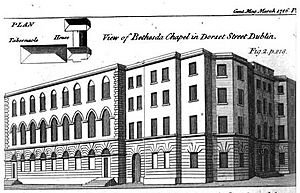John Walker (1769–1833) facts for kids
John Walker (born 1769, died 1833) was an important religious leader in Ireland. He was a priest and a scholar in the Church of Ireland, but he had strong beliefs that were called "evangelical" and "Calvinist." He eventually left the Church of Ireland and started his own religious group, which he called "the Church of God." People sometimes called his followers "Walkerites."
Contents
John Walker's Early Life
John Walker was born in Ireland, either in County Roscommon or County Tipperary. His father, Matthew Walker, was also a clergyman in the Church of Ireland.
John Walker started studying at Trinity College, Dublin, in 1785. He was a very good student, becoming a scholar in 1788. He earned his first degree (B.A.) in 1790 and continued his studies, getting his M.A. in 1796 and B.D. in 1800.
In 1791, Walker became a priest in the Church of Ireland. After that, he was chosen as a fellow of Trinity College, which meant he was a senior member of the university staff.
His Evangelical Beliefs
In 1791, a religious group called the Countess of Huntingdon's Connexion asked Walker to teach William Henry. William Henry later became a missionary in Tahiti.
From 1794 to 1804, Walker worked as a chaplain at the Bethesda Chapel, Dublin. This chapel was a key place for evangelical Christians. It was started in 1786 by William Smyth, a rich merchant who followed the teachings of William Romaine. The chapel was also connected to a home for orphaned girls.
In 1794, William Smyth gave control of the chapel to five trustees, including Walker. However, Robert Fowler, who was the Archbishop of the Church of Ireland, did not approve. He stopped Walker and four other priests from preaching in regular churches. Because of this, Walker and the others spent more time at the Bethesda Chapel. Walker also helped with the Locks Penitentiary, a place that offered work for women who had been released from the Lock Hospital.
Around this time, the Bethesda Chapel became more focused on "Calvinist" ideas, which meant it faced more opposition from the Church of Ireland leaders. Many students from Trinity College attended the chapel, which helped spread evangelical ideas. Arthur Guinness II, who was famous for his family's brewing business, was also a member of this church.
In 1798, Walker became the only chaplain at the chapel. During the 1790s, he also took part in religious revival meetings in County Armagh. He preached in places like Richhill, along with other well-known preachers such as Rowland Hill.
Why He Left the Church
John Walker started to deeply study how the first Christians lived and worshipped together. He became convinced that the Church of Ireland had moved away from these early practices.
On October 8, 1804, Walker decided he could no longer be a priest in the Church of Ireland. He told the head of Trinity College that he wanted to resign from his position there. The very next day, he was expelled from the college. At the Bethesda Chapel, another trustee named Benjamin Williams Mathias took over Walker's role as chaplain.
Walker then gathered a group of people who shared his beliefs in Stafford Street, Dublin. He supported himself by giving lectures on university subjects. After visiting Scotland several times, he moved to London in 1819.
In 1833, Trinity College gave Walker a pension of £600. He moved back to Dublin and passed away on October 25 of that year. He was married and had a daughter named Mary.
The Church of God
Walker's new religious groups, which he called "the Church of God," were small, with about a dozen congregations. His followers often called themselves "Separatists" or "Walkerites."
Walker taught that his followers should separate themselves from the world. He believed in following the original practices of the apostles and strongly opposed established religions. He was very firm in his religious arguments. For example, during a meeting with followers of his friend Thomas Kelly (called "Kellyites"), the meeting ended because Walker insisted that "John Wesley is in hell."
His Writings
John Walker was a scholar and wrote many educational books. Some of his publications include:
- Letters to Alexander Knox, published in Dublin in 1803.
- An Expostulatory Address to Members of the Methodist Society in Ireland, a third edition published in Dublin in 1804.
- A Full and Plain Account of the Horatian Metres, published in Glasgow in 1822.
- Essays and Correspondence, edited by W. Burton, published in London in 1838.
- The Sabbath a Type of the Lord Jesus Christ, published in London in 1866.
He also edited several important classical and mathematical works:
- Livy's Historiarum Libri qui supersunt, a seven-volume work published in Dublin between 1797 and 1813.
- The First, Second, and Sixth Books of Euclid's Elements, published in Dublin in 1808.
- Selections from Lucian, published in Glasgow in 1816.
For the opening of the Bethesda Chapel on June 22, 1794, Walker wrote two hymns. One of them, "Thou God of Power and God of Love," was later included in many hymn collections.
 | James Van Der Zee |
 | Alma Thomas |
 | Ellis Wilson |
 | Margaret Taylor-Burroughs |


